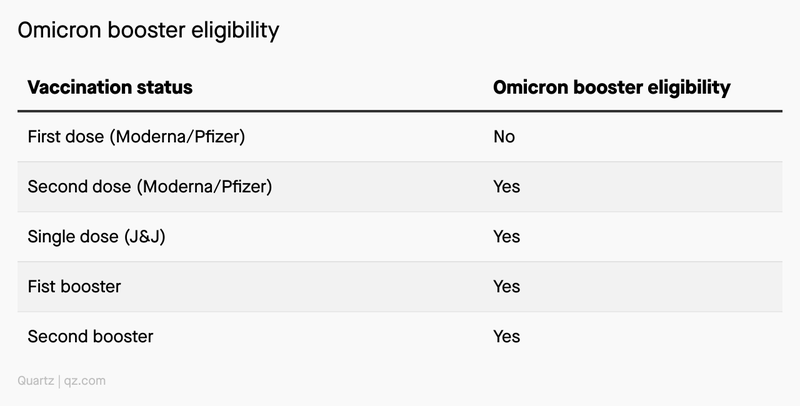240 million Americans will likely be eligible for omicron-specific vaccine boosters after Labor Day
Americans 12 and older may soon become eligible for yet another covid booster. Both Pfizer and Moderna have requested authorization from the US Food and Drug Administration (FDA) for a new round of covid shots, this time targeted specifically against the omicron variant, which is now responsible for more than 90% of cases in the country.
Pfizer has requested authorization for boosters for everyone age 12 or older, or about 240 million people, while Moderna’s request is for all adults ages 18 and up, or 200 million people. The FDA is expected to give authorization after Labor Day (Sept. 5), after which the US Centers for Disease Control and Prevention (CDC) will provide its recommendations for eligibility.
The Pfizer vaccine is expected to be available shortly after the approval, while the Moderna version will likely take longer, and become available in October or later. It’s yet unclear whether everyone eligible will be offered the omicron-specific vaccine immediately, as supplies may be limited. If that is the case, the campaign will begin with older and immunocompromised people.
What percentage of those eligible who would actually end up getting the booster remains to be seen, considering only about half of those eligible for the first booster have received it so far. The percentage went down even more with the second booster, which has only been administered to a third of the eligible population.
Who will be eligible for the new covid booster?
So far, most Americans have been offered a full vaccination course (two doses, or one for those who received the Johnson & Johnson vaccine). Six months after the second shot (or two months after the J&J shot), all fully vaccinated individuals became eligible for a booster shot. In the majority of cases, people got boosters in late 2021 or early 2022, and the protection has somewhat waned since, which combined with the limited booster uptake contributed to the spread of omicron.
People over 50 and some severely or moderately immunocompromised people have also been offered a second booster, four months after the first.
This means the population is approaching the booster with different immunization status: Some only got a first dose, some a full vaccination course, some are boosted, some are even double boosted. Some people have had covid, some have had it more than once, some don’t know if they ever got it, some never did.
But the actual booster roll out will likely not be as confusing as it might seem: Pretty much everyone who has been fully vaccinated, irrespective of number of boosters, dates, and covid infection history, will be eligible.
Those who aren’t vaccinated, or only received the first dose of mRNA vaccines, need to complete the initial vaccination course in order to qualify for the updated booster.

Should eligible patients get the second booster?
Those who qualify for a second booster but haven’t gotten it yet might be tempted to wait for the omicron-specific one, but they shouldn’t. Receiving a second booster now will help their immunity against the virus, and will likely not disqualify them from getting an omicron-specific booster when it becomes available, according to White House covid response coordinator Ashish Jha.
Can I mix and match omicron boosters?
As with the previous boosters, people will likely be able to get a shot even if it doesn’t match the ones they received earlier. The only caveat is that only Pfizer has applied to be approved for children between 12 and 18, so they wouldn’t be eligible for a Moderna booster.
What if I got the J&J vaccine?
People who got the Johnson & Johnson vaccine, whether or not they received a Moderna or Pfizer booster, will qualify for the omicron-specific boosters.
What about children and teens?
No omicron-specific booster will be available for children below 12, at least for the moment, even the immunocompromised. Children between six months and five years old have been eligible for the vaccine since June of 2022, although less than 3% have received at least one dose so far.
Prior to the anticipated approval of the omicron-specific booster, immunocompromised children and teens qualified for one regular booster if they were between five and 11, and two boosters if they were between 12 and 17.

